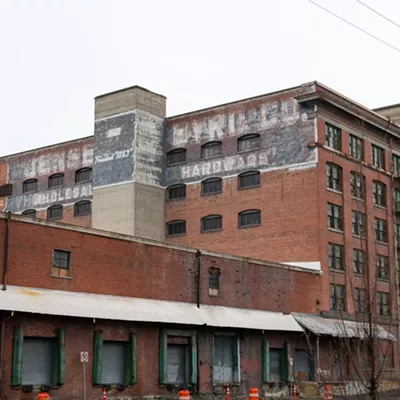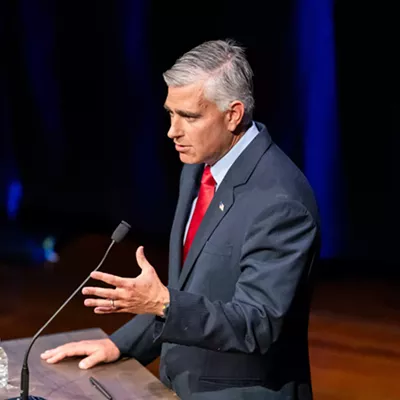In light of recent regulatory changes that Initiative 2066 backers call a "de facto natural gas ban," Washington voters will be asked whether they want to prevent state and local government bodies from even discouraging the use of gas, as well as make sweeping changes to how the state's largest utility can plan for the future.
The initiative is one of three backed by the political action committee Let's Go Washington that will appear on the Nov. 5 ballot. The committee is supported by a slew of building industry groups and was started by hedge fund manager Brian Heywood.
"I don't think the state has any business dictating what form of energy people should be using to cook and heat their homes," Heywood says.
Let's Go Washington is promoting I-2066 with the slogan, "Stop the Gas Ban."
The No on I-2066 campaign, launched this month, is backed by environmental groups, renewable energy companies, companies that design and build energy efficient homes, medical associations, and more. The "no" campaign says that I-2066 "would increase energy bills," "attacks energy efficiency," "is funded by powerful interest groups," and "would stop towns, cities and counties from making decisions that work best for their communities."
"They are talking about gas bans, and there's simply no such thing," says Leah Missik, the Washington deputy policy director for Climate Solutions, a nonprofit working to accelerate the clean energy transition. "If you live in a gas utility's territory, and you want to be served, they have to serve you. That's state law."
WHAT IT WOULD DO
The initiative's first line reads, "The people find that having access to natural gas enhances the safety, welfare, and standard of living of all people in Washington."It would create new sections in state law, and amend several existing sections, with the intent of promoting "energy choice, security, independence, and resilience throughout the state," and acknowledging that natural gas "serves as a backup source of energy during emergencies."
I-2066 would make several changes to House Bill 1589, which passed on the last day of this year's legislative session.
Heywood says in its original form, the bill would've outright banned new natural gas hookups for Western Washington customers, which was part of the impetus for writing the initiative with the Building Industry Association of Washington.
As signed into law, 1589 changes the way that Puget Sound Energy, the state's largest utility, plans for the future, requiring it to create one integrated system plan for both its electricity and natural gas sales. The utility needs to evaluate the lowest reasonable cost of decarbonization measures required by multiple state laws that require greenhouse gas emission reductions.
"To me, it was just Olympia flipping the bird to the voters saying, 'We don't give a crap what you guys think, or how this impacts you,'" Heywood says. "'For this ideological agenda, we're going to push this through and you can all take it and we're gonna shove a cracker down your throat.'"
The initiative would prevent the Utilities and Transportation Commission from approving any integrated system plans that would involuntarily move customers off of natural gas by restricting access or making it cost prohibitive.
Missik says the initiative "strikes cost effective electrification planning for Puget Sound Energy," and the passage of 1589 provided a method for the utility to holistically plan for its entire system under one document.
"They're looking at the electric and gas side of their business in conjunction. It doesn't make sense to view each of those things in a vacuum," Missik says. "[The initiative] also jeopardizes federal funding that Washington could give to people who want to make energy efficient upgrades."
Programs such as the state's Home Electrification and Appliance Rebates, which has provided Spokane County nearly $1.6 million to help low-income families upgrade to electric heating, could also be at risk if the initiative passes, says Gavin Tenold, owner and general contractor at Northwest Renewables in Spokane.
Tenold helps install electric heat pumps, and says they're cost-effective, efficient appliances that save customers money. He is encouraging people to vote "no" on I-2066.
"I think it has very broad sweeping impacts across all sorts of very popular common sense policies and programs that are intended to in fact make energy more affordable," Tenold says.
DON'T EVEN DISCOURAGE IT
Perhaps most significantly, I-2066 also would prevent the state building code council, cities, towns, counties and clean air agencies from restricting natural gas usage, adding language to state law for each of those authorities that says they "shall not in any way prohibit, penalize, or discourage the use of gas for any form of heating, or for uses related to any appliance or equipment, in any building.""We don't care whether you say it's a ban, whether you say it's not a ban, whether it's a hidden ban," Heywood says. "We're going to preemptively say you may not ban it."
The state building code council's latest changes require new construction to meet specific energy efficiency scores. Missik says the easiest and cheapest way to meet those standards is to install electric heat pumps for heating and cooling and forgo natural gas appliances. If a customer still wants natural gas, they must build in other efficiencies that may be more expensive, such as highly rated insulation materials.
"That means builders would have to comply with energy efficiency codes by using the most expensive envelope components," Missik says. "If they're concerned about energy efficiency being a driver of increased code costs, they did not address that."
Kara Odegard — who works as a consultant for Spokane-based company Measure Meant, helping tribes and other customers plan for energy efficiency — agrees and supports the "No on I-2066" campaign.
"2066 would roll back energy efficiency standards for the entire state, which are really important not only to keep consumer energy costs low, but also an important way for us to address the state's contributions to climate pollution," Odegard says.
She says the state is creating an integrated system plan for the largest utility, which could later be used by other utilities such as Avista, so that customers who can't afford to get off of the less efficient system "aren't going to be stuck on the old system and paying exorbitant prices." She compares it to when many homeowners switched from oil heating to natural gas, noting that those who were the last to transition saw their costs increase.
"It feels like they're trying to solve a problem that doesn't exist," Odegard says of the initiative backers. "People don't care what fuel is heating their home. They just care that it works and that it's saving them money, and this effort is going to derail all of that."
Heywood pushes back on the idea that there's no plan to ban natural gas, or the idea that nothing in current code effectively bans it by making it more cost prohibitive.
"Ironically, on this one, the state is gaslighting about the 'no desire to ban natural gas,'" Heywood says. "If there's no plan to ban natural gas ... they shouldn't be worried."
FINANCIAL INTERESTS
According to filings with the Public Disclosure Commission, Let's Go Washington (which supported six initiatives this year) has raised more than $5.5 million. The political action committee has received $100,000 from Spokane developer Larry Stone, a combined $25,000 from Cowles Company President and Spokesman-Review publisher William Stacey Cowles and his wife Anne Cowles, $15,000 from William Bouten of Bouten Construction, and $10,000 from Washington Trust Bank. More than $1 million of the committee's funding was from the "Main Street Matters to Washington" committee, which is supported by the National Association of Home Builders, Washington Realtors, Associated General Contractors of Washington BUILD PAC, Kaiser Aluminum and others.The No on 2066 committee, according to PDC filings, has raised just less than $100,000, and received $34,000 (in-kind) from Washington, D.C.-based Rewiring America, Inc., $25,000 from the Washington Conservation Voters Action Fund, $10,000 from Washington Conservation Action and a variety of small donations. ♦
























